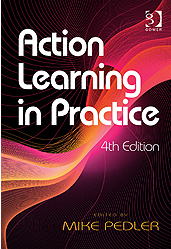Action Learning in Practice 4th Edition

Pedler M (2012)
Reviewer: Steven Whitehouse – Principal IT Manager UK
Having already reviewed Revans (2011) ‘ABC of Action Learning’ in this journal I now have pleasure in reviewing this publication; ‘Action Learning in Practice’. It is pleasing to repeatedly see that authors both past and present still accord the highest regard to Revans’ not only as the ‘father of Action Learning’ but also rightful and proven appreciation that his seminal work was well ahead of its time. Perhaps now its time has come, as increasingly there is clear demand that organisations are characterised by rational and systematic action.
The 4th edition is fully revised and deals with the origins, development, and application of action learning. This means self-directed learning from real work and business issues, with peer-group support. Developing the workforce in this way helps to deal with increasing complexity at work. Action learning is less limiting than conventional approaches, and has becoming more popular with business leaders over the last ten to fifteen years.
Professor Mike Pedler is Emeritus Professor of Action Learning at Henley Management School and partner in Action Learning for Service Improvement (ALSI) and the Centre for Action Learning Facilitation (Calf). He works with commercial, voluntary and public sector client organisations and is known for his work on self-development, leadership, network development and the learning organisation.
Contents:
Introduction: The state of the art, Mike Pedler
Part 1 Origins: Introduction to part 1; Action learning: its origins and nature, Reg Revans; The enterprise as a learning system, Reg Revans; The power of action learning, Bob Garratt; Minding our Ps and Qs, John Morris; Continuity in action learning, Jean Lawrence; David Casey on the role of the set adviser, David Casey; Digging deeper: foundations of Revans' gold standard of action learning, Verna J. Willis; Ad fontes – Reg Revans: some early sources of his personal growth and values, Yury Boshyk; Getting started: an action manual, David Pearce.
Part 2 Varieties: Introduction to part 2; Self-managed action learning, Tom Bourner; Action reflection learning, Lennart Rohlin; Business-driven action learning today, Yury Boshyk; Virtual action learning, Mollie Goodman and Jean-Anne Stewart; Critical action learning, Kiran Trehan; The practice and politics of living enquiry, Judi Marshall; The varieties of action learning in practice: a rose by any other name, Judy O'Neil and Victoria J. Marsick
Part 3 Applications: Introduction to part 3; Leadership, Richard Thorpe; Developing facilitative leaders: action learning facilitator training as leadership development, Katie Venner; Action learning in SME development, Lisa Anderson, Jeff Gold and Allan Gibb; Addressing systemic issues in public services, Clare Rigg; Action learning for organisation development in South Korea, Yonjoo Cho and Hyeon-Cheol Bong; Facilitation and the affective domain, Ian McGill and Anne Brockbank; Learning to be an action learning facilitator: three approaches, Christine Abbott and Tom Boydell; Action learning and organisation development, John Edmonstone; Network learning in an Austrian hospital – revisited, Otmar Donnenberg; Action learning and social capital, Mike Pedler and Margaret Attwood; Action learning round the world, Michael J. Marquardt.
Part 4 Questions: Introduction to part 4; Action learning: a pragmatic and moral philosophy, John Burgoyne; Practical knowing: the philosophy and methodology of action learning research, David Coghlan; The action modalities: action learning's good company, Joe Raelin; Action in action learning, Roland Yeo and Jeff Gold; Learning in action or learning inaction? Emotion and politics in action learning, Russ Vince; Reflective practice: origins and interpretations, Michael Reynolds; Adult learning theories and the practice of action learning, Deborah Waddill and Michael Marquardt; Evaluating action learning: a perspective informed by critical realism, network and complex adaptive systems theory, John Burgoyne; Index.


